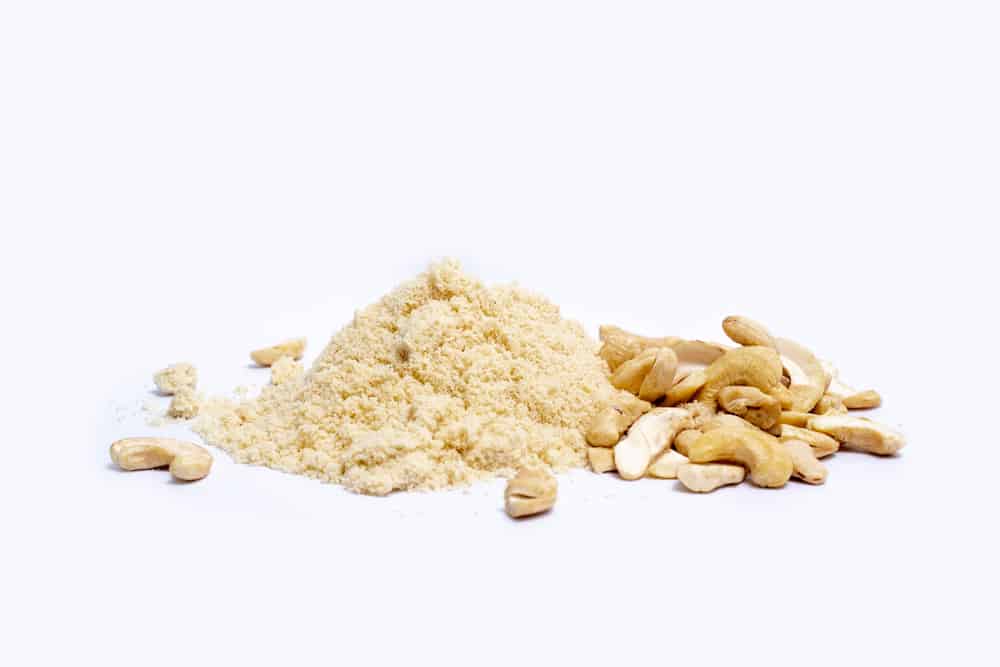ENJOY Free U.S. Shipping on Orders $59+. Shipping not available to Canada, Mexico & non-contiguous U.S. Dismiss

With growing knowledge about Celiac disease and gluten intolerance, more and more flour alternatives have been popping up in recipes and grocery stores. Many people are interested in these healthier alternatives, but may be scared to use them, especially in precise recipes like baking, where the wrong use of flour can ruin your recipe. But cashew flour is an easier substitute for traditional, white, all-purpose flour than you may think. In some cases, you can swap it out with no concerns, but in others, you may want to tweak your recipe. If you want to explore cashew flour, here are some tips to help you feel more comfortable.
One of the nice things about cashew flour is that you can produce your own at home, unlike all-purpose flour. Making your own cashew flour is as simple as grinding raw cashews in a food processor until they become the texture of flour. The key is stopping before it starts to become cashew butter. While this is simple and effective, you’ll want to make sure that the cashews you use are high quality and ethically sourced. This isn’t always the case with store-bought cashews, so paying attention to ingredients and labor practices should be a part of your cashew flour process.
You can also buy cashew flour pre-packaged. Some store-bought brands will have the same issues as cashews. If you want to avoid the work of making your own cashew flour while maximizing the health and sustainability of your ingredients, Beyond the Nut offers pure cashew flour ready to use.
You may also be confused if you see both cashew meal and cashew flour available. After all, things like all-purpose flour and cornmeal are very different in terms of usage and taste. When it comes to an alternative, cashew meal and cashew flour are more alike than different. Cashew meal is simply a bit coarser than cashew flour, making the latter more suited to delicate baking projects or use as a thickening agent.
Another popular flour substitute is almond flour- many available gluten-free and keto recipes will call for this nut flour. In essence, it is very similar to cashew flour in that it is simply ground almonds. Cashew flour is known to be one of the best and closest substitutes for almond flour. This is especially helpful as no conversion is required- if a recipe calls for 1 cup of almond flour, you can simply use 1 cup of cashew flour. The flavor profile will be similar and you’ll benefit from all the nutritional elements of cashews in your recipe!
When using any new product in the kitchen, it can be helpful to experiment and get comfortable with any differences from the ingredients you are used to using. Cashew flour can come in to play anywhere you would use regular flour, from baking to thickening sauces to breading a protein, and the transition should be fairly simple.
If you are substituting cashew flour for regular all-purpose flour, many people like to start by only substituting a portion of the original flour. So if a recipe calls for 1 cup of flour, start with ½ cup of that and ½ cup of cashew flour. This can help you understand the more savory, aromatic flavor that cashew flour may bring and determine if it fits the needs of your recipe. Many people even prefer the slightly sweet, almost creamy notes that the flour adds.
You may find that some vegan recipes are better with cashew flour and some do not work for you, and that’s okay! The more you use cashew flour, the more you will understand where the substitution works for you.
Just like any ingredient, the quality of your cashew flour will determine how successful your recipe ultimately becomes. Beyond the Nut offers both cashews and cashew flour that will provide you a solid base for any recipe. Our organic, fair trade, vegan, gluten-free, and GMO-free, giving you the perfect start to healthy recipes that are just as delicious as you’d hope!
Fuel Your Beyond with the Latest Discounts, Promotions, and Product Announcements